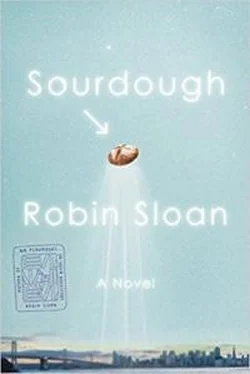I shook my head ruefully. The only living thing I had ever managed to support was myself, and then only barely, except for—
“Maybe a plant?”
“Yes!” I said. “I have a desk cactus.”
“Okay! This culture—starter, sorry—it’s like that. It’s alive.” He lifted the crock’s lid. “See?”
The gray slime inside looked distinctly not alive. It looked like an enemy of aliveness. Like something alive things crossed the street to avoid.
“Smell,” he commanded, and offered the crock, tilting it toward me. “Can you detect it?”
I took a guarded sniff, allowing no more than two or three molecules from the decrepit vessel into my nose. I equivocated. “What is it supposed to smell like?”
“Bananas, a bit. It’s a very nice smell.”
I sniffed again, still detected nothing, but nodded my head agreeably. “You’re right. That is nice.” It was the same strategy I employed at wine tastings.
Beoreg beamed. “But you have to feed it, okay? Keep it going. I’ll show you how.”
He plopped his selection of tools onto the countertop. First was a stout, thick-papered sack of flour, the top neatly folded and chip-clipped. “Whole flour,” he said. “It has to be whole.” Next came a small mixing bowl and a long-handled cup. “Measure twenty grams—just this much.” He lowered the cup into the sack, leveled it with his finger. “See?” He dumped the flour into the mixing bowl, then filled the same long-handled cup with water from the tap. “The same amount.” He added the water to the bowl, snatched up the last of his tools, a short wooden spoon, and started to stir.
Chaiman had been fishing around in the trunk, and he stood holding a CD jewel case. “You must play the music of the Mazg, too!” he declared.
I dug out my hulking General Dexterity laptop and felt along its edge for the CD tray I had never once used. Inside Chaiman’s jewel case there was a plain disc with its title handwritten in the mystery script of the menu. I dropped it into the tray. The laptop cleared its throat, whining and clicking, and sound began to flow from its speakers. It was the brothers’ hold music, sad and inimitable, crooned in that unfamiliar language. The language of the Mazg. As it played, Beoreg and Chaiman seemed to slow down and synchronize. Chaiman’s posture relaxed and Beoreg’s eyes softened as he stirred.
“This is the starter’s food—see?” Beoreg said, showing me how the water and flour had combined into a pale paste. “It’s important to feed it every day. If you skip a day, it will be okay, but not any longer than that.”
This was seeming like more and more of a commitment.
Beoreg looked me in the eye for the first time, his gaze suddenly searching. “You’ll keep it alive?”
I should have backed out. I should have thanked the brothers one last time for all the combos (double spicy) and escorted them back to their taxi waiting in the street. Instead, I said: “Of course I will.”
Beoreg beamed. “Good! And you can bake with it. That’s great.” His eyes flickered down. He handed me the mixing bowl with its pasty contents. “Here, you can feed the starter now. Your first time.”
I scooped up the floury paste with the spoon, held it for a moment over the shimmering maw of the crock, then plopped it in.
“Do I stir it together?”
“Yes, until it’s all mixed.”
The pasty food marbled into the dark starter, and then the combined mixture faded to an even gray. I kept stirring, and stirring, until Beoreg said gently, “That’s enough.” He took the spoon, washed it quickly under the tap, then laid it neatly beside the mixing bowl and the long-handled cup. “All of these, you can keep.”
He set the crock’s lid into place with the gentleness of a parent tucking a child into bed.
I wondered what else was inside that trunk. “What about the spicy soup? Can I make that, too?”
Beoreg looked sheepish. “It’s more complicated. I can write it down, maybe. Here.” He scrounged for a pen, crouched in front of the refrigerator, and wrote an email address along the bottom edge of their menu. It was the same dark, sure script; that was Beoreg’s handwriting. “Send me a message.”
The brothers shuffled out of my apartment and into the taxi, still waving as its door clomped shut. The taxi’s tires squeaked as it leapt forward into the night, carrying them to the airport or the bus station or, who knows, maybe to a boat waiting at some lonely pier.
Back in the apartment, the CD was still playing, sweet and sad.
SPARTAN STIX
LET ME JUST ESTABLISH where I was at with the whole cooking situation.
When I was a child, my family had no distinguishable cuisine. I remember Happy Meal hamburgers and Hungry-Man fried chicken. I remember the Denny’s menu; we knew that backward and forward. I remember tubs of popcorn at the movies. Tubs of popcorn for dinner.
We possessed no stock of recipes, no traditions, no ancestral affinities. There was a lot of migration and drama in our history; our line had been broken not once but many times, like one of those gruesome accident reports, the bone shattered in six places. When they put my family back together, they left out the food.
There was one exception. My grandma Lois, for whom I was named, did not deign to cook—she was my mother’s mother in that regard—but she did, on special occasions, bake bread. Specifically, she baked Chicago Prison Loaf, a comically hard and dense but apparently nutritious substance that she had learned to produce working part-time at an industrial bakery that served the Illinois Department of Corrections. In my family, Chicago Prison Loaf was a joke—a grim surprise often wrapped up for Christmas in a box chosen for its resemblance to a nice sweater or a video game console. Grandma Lois did seem to genuinely enjoy eating it, toasted and slathered. The rest of us, we buttered the bread we bought at the grocery store.
My high school cafeteria offered a rotating daily menu item, but I can assure you that I never chose it. Instead: fries, fries, two orders of fries! Fries so perfectly crisp they put fast-food fries to shame, fries crusted with salt and eaten one by one, fries not merely consumed but circulated as social currency: peace offerings, seductions. Four years in that cafeteria and I ate nothing but fries. The teenage body is a miracle. How did it scrounge from those sticks of burnt starch enough vitamins and minerals to sustain me, and not just sustain me but make me grow, and grow absurdly, grow six inches, grow boobs and hips? It was a disgusting diet. I realize that now. I bow down before that body.
In college, I did not immediately realize that it was behind me. The summer before freshman year, the One Campus, One Book selection had converted me to vegetarianism, which meant the things I ate never seemed to fill me up. Armed with a dormitory meal plan, I consumed the equivalent of nine meals a day, all of them shaded brown, textured crispy. You would expect a vegetarian, perhaps, to eat vegetables; you would be disappointed. There was never on my tray a single tuft of green.
I sat in various dorm rooms with my computer science cabal, plowing through problem sets, eating whole pizzas and so-called Spartan Sticks—named for the school’s mascot, and upon reflection, it may have been spelled Stix—which were just pizzas that omitted tomato sauce and compensated for its absence with more cheese and even more cheese and a flaky garlic powder that carried a hot chemical burn.
Four years of this. By the end, I was a puffy caricature of myself. As my senior year started, I did finally realize that something had gone wrong; that the teenage machine had broken down, and that my body—desperate, pushed beyond any reasonable nutritional tolerances—was simply building new parts out of salt. I tried to improve my diet, but only in the most marginal and clueless ways. I stopped ordering whole pizzas and bought family-size tubs of hummus. I consumed baby carrots by the pound.
Читать дальше










